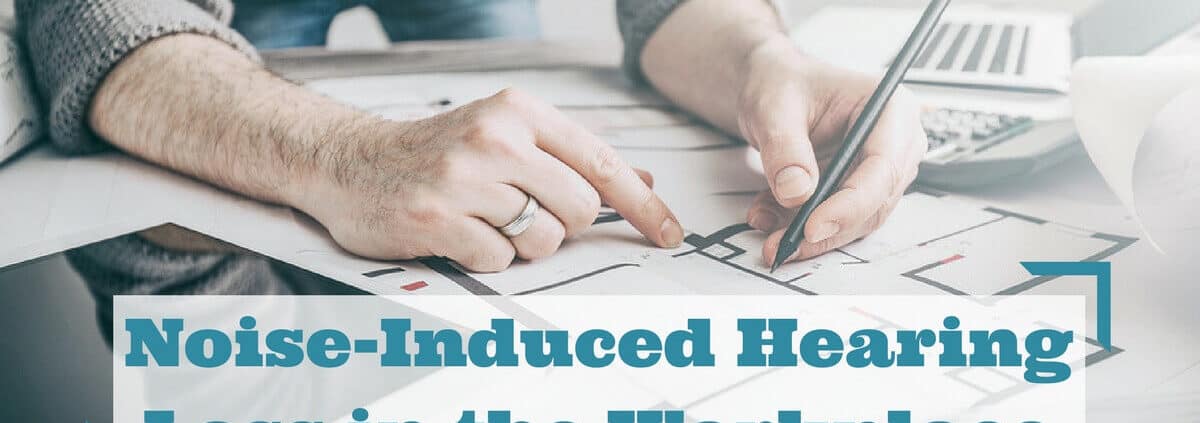Noise-Induced Hearing Loss in the Workplace
There are a number of reasons that a responsible and respectful sound environment in the workplace is paramount to workers’ safety. Loud or aggressive noises are distractions that put employees in such environments at a greater risk of miscommunication or errors that result in injury. These environments also create a higher degree of stress, both emotional and mental, in individuals. However, perhaps the most dangerous effect of such noises is the potential long-term and irreversible hearing loss that can occur.
Loud noise is an inescapable element of certain professions
You may find yourself in an industry in which loud and potentially harmful noise comes with the territory. Some of the most ubiquitous fields carry a certain degree of loudness inherent to their existence. These include construction and factory work, those in the concert and music industry, farmworkers, and airport ground staff. Our society is dependent upon the very existence of these employees! While we can’t eliminate the dangerous field of work, we can take steps to ensure that folks in these fields protect their hearing as well as possible.
Spotting the signs of a dangerous noise environment
There are a few clues to help you evaluate whether your workplace noise levels are at a dangerous level:
Do your ears ring during or after leaving work?
Must you shout in order to talk to a coworker within an arms’ length?
Have you experienced temporary hearing loss after leaving work?
These short-term effects may also include something as subtle as feeling as though your ears are stuffed up or as if you are hearing “under water.”
The effects of workplace hearing loss are insidious
The short-term effects can be disconcerting, but the long-term effects of noise induced hearing loss are irreversible. Hearing loss often occurs gradually over time, so repeated exposure to such noises is insidious. Eventually, you will lose the ability to hear high frequency sounds. Voices in conversation will appear distorted. Folks with mild to moderate hearing loss can find listening to become so effortful that they avoid conversation and socialization. This could result in damage to your interpersonal relationships and might lead to feelings of loneliness, isolation and depression.
Ways to control noise induced hearing loss in the workplace
Guidelines regarding noise are in place and enforced among most industries. Most often, the steps taken are either engineering or administrative adjustments. Engineering adjustments included choosing low-noise machinery, placing physical barriers such as walls or heavy curtains between the employee and the source of noise, as well as maintaining proper maintenance schedules to ensure that machinery is lubricated properly and therefore operating more quietly.
Administrative adjustments might result in scheduling the noisiest work during off peak times when less employees are in the vicinity and thus exposed. They may also rotate schedules and duties so that time near dangerous noise is limited and access to quiet spaces is available to give your ears a break.
At the very least, wearing noise cancelling headphones, earmuffs or earplugs can be an easy and cost-effective way to protect your hearing.
Managing your own hearing health
When you’re not at work, make sure that you’re giving your ears a break. Turn down the volumes on your car and home stereos, which can creep up over time if you’re not paying careful attention. When wearing headphones, ensure that you can hear the outside noises around you. If you can’t, that’s a clear indication that the volume on your device is cranked up too loud!
Walk away from loud noises. It seems like a real no-brainer, but how many times have you fought with the crowd for a better spot at a rock concert? Or, carted your blanket right up to the front of the fireworks display? When presented with the option of a “great seat,” ask yourself if your ears might be inadvertently paying the price.
If you are in a noisy industry, or if you are concerned at all with your long-term hearing health, it is a good practice to schedule an annual hearing exam. In addition to the long-term exposure of dangerous noise levels, hearing loss is also just a natural part of the aging process.
Ways to manage hearing loss
If you believe you are experiencing hearing loss, the first step is to contact us at Bay Area Hearing Services to schedule a hearing test. There are a number of options for you to maintain a normal and harmonious life!
The hearing aid industry has progressed right alongside the rest of the technological revolution, and today’s hearing aids are advanced and nearly undetectable. They’re as smart as your phone, too, with Bluetooth capabilities in a number of options to sync your hearing with all the devices that make up your audio life.
Contact us at Bay Area Hearing Services today to schedule a consultation.



